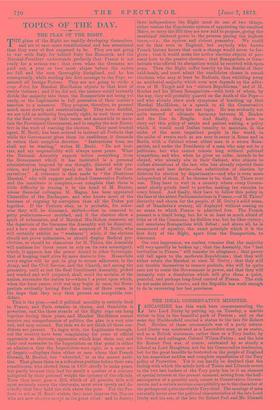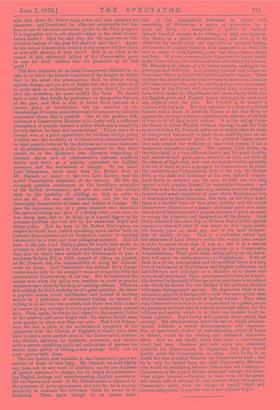THE IDEAL CONSERVATIVE MINISTER.
LANCASHIRE has this week been commemorating the late Lord Derby by putting up, on Tuesday, a marble statue to him in the beautiful park of Preston ; and on the same day Huddersfield erected a statue to the late Sir Robert Peel. Neither of these ceremonials was of a party nature. Lord Derby was celebrated as a Lancashire man, as an orator, and as a British statesman, rather than as a Tory leader, by his friend and colleague, Colonel Wilson-Patten ; and the late Sir Robert Peel was, of course, celebrated by so sturdy a Liberal as Lord Houghton, not for his Conservative tendencies, but for the great benefits he bestowed on the people of England by his somewhat sudden and complete repudiation of the Tory policy of Protection. Yet it can hardly be doubted that the feeling with which the minds both of Tories and Liberals revert to the two last leaders of the Tory party has in it an element of special interest at the present moment, arising from the half- anticipation of a possibly early return to Conservative Govern- ments, and a certain nervous susceptibility as to the character of the perhaps not quite inevitable Tory chief. The musings of men naturally hover over the political characteristics of the late Lord Derby and his son, of the late Sir Robert Peel and Mr. Disraeli The first requisite for an ideal Conservative Minister is, we grotesque and ludicrous. And nothing irritates true Conserva- take it, to value the historic traditions of the Empire so highly tives more than a policy of odd and inexplicable caprice. There that to his mind the presumption shall be always strong isalways the deepest possible sensitiveness to manner and form in against change, and yet not so highly but that his mind shall all Conservative parties, and the one thing they crave is a manner be quite open to evidence tending to prove that if he would and form of the historic and conventional kind, a manner and save the substance, he must modify the form. He should form which make the Englishman feel more deeply than ever have a mind that dwells by preference on the greater features his English pride and English hopes, and repel the notion of of the past, and that is able to bathe these features in a any rupture with the past. Mr. Disraeli is in himself a certain glory of recollection, but yet sensitive to the rupture with the past. His very existence is a freak of political threatenings of events, and always ready to conquer by judicious Nature, and a freak of political Nature is tho last thing to concession where that is possible. One of the greatest diffi- appease the craving for historic justifications, whether of all that culties of a Conservative Minister is to clothe with a sufficient is done or of all that is left undone. It is like asking Cedric atmosphere of popular interest a policy which must, usually by the Saxon to follow Wamba without wincing, to ask the Tory its very nature, be tame and unsensational. Unless there be a squires to follow Mr. Disraeli, and never to shrink when he turns foreign war, or a great opportunity for brilliant foreign policy an unexpected somersault or leads them suddenly into an un- without war, the tendency of a Conservative administration is explored and sequestered glade of the political forest, where to repel popular interest by the dullness and routine character they may suspect the workings of some wild caprice, if not a of its measures ;—and in order to compensate for this, there dangerous ambush or a snare. The present Lord Derby, on should be in the Minister's own character something of the other hand, is a very different leader, and his great lucidity personal charm and of representative national qualities, and matter-of-fact good sense, invested as they are with all which may serve as a popular equivalent for brilliant the charm of high rank and vast territorial wealth, probably measures and the excitement of change. To our mind, hold out at least as good a prospect to Conservatives as either Lord Palmerston, much more than Sir Robert Peel, or the extraordinary Parliamentary skill of the late Sir Robert Mr. Disraeli, or either of the two Lord Derbys, was the Peel, or the dash and brilliance of his own father's oratory. model Conservative statesman of the century. He felt the Lord Derby is certainly not the man to hold out too long strongest possible _attachment to the hereditary principles against a real, popular demand for reasonable concession ; and of the British Government, and yet his mind was always still less is he the man to make any mistake as to the straight- open to the necessity of yielding an inch in order to forward and manly simplicity of tone which Englishmen love save an ell. He was never reactionary, and yet he was to hear taken by their statesmen. But then, on the other band, thoroughly Conservative at heart, and jealous of change. He there is a marked want of that glow, vivacity, and life which gave the impression, too, of a great minister who embodied Conservative Ministries of a passive character need even more the national feeling and gave it a fitting voice, even when he than Liberal Ministries which propose changes of great moment was doing least, and so he filled up in a great degree by his to occupy the attention and imagination of the people. Lord personal qualities the void left by his somewhat frigid and Derby admitted the other day at Preston that a public speech sleepy policy. Had he been in Sir Robert Peel's place, we remains to him still what it was when he first began public suspect he would have yielded something much earlier both on life twenty years or more ago, one of the most disagree- Catholic Emancipation and on Protection, instead of resisting able of earthly duties. That is a confession which very vehemently for a time, and then collapsing suddenly. Had he few observers of Lord Derby's public life would have needed been in the late Lord Derby's place, he would have made no in order to assure them that it was so ; and it is a serious attempt in 1852 to stand by the condemned policy of Protec- drawback to his power of giving prestige to a Conservative tion, and he would have assisted the Government to pass a Administration. Tame good sense, acting solely on the defen- moderate Reform Bill in 1866, instead of taking on himself, sive, will never be really attractive to Englishmen. With all as Mr. Disraeli did, the responsibility of doing the Liberals' their love of the conventional and the practical, there is a deep work for them. Lord Palmerston was unfitted for a Conser- love of excitement in Englishmen and English politicians, and vative leader only by his complete want of sympathy with the Lord Derby's very principle as a Minister is to throw cold ecclesiastical Conservatism of his day. But he interested the water on all excitement. Then, unfortunately for him,he is speci- nation even when his policy was inactive, as much as greater ally devoted to the study of foreign policy, and there is no subject ministers have done by the help of exciting reforms. When he over which he throws the wet blanket of his political intellect did nothing, he did it with the air of a great minister. He threw with more distinguished success. He deprecates what is sen- a popular charm round indifference, and instead of inviting sational in projects of foreign policy with even more ability than attack by a profession of reactionary feeling, he seemed so what is sensational in projects of radical reform. Now, what willing to do all that was prudent, that there was little chance even Conservatives love is to be compensated by a grand, not to
of success in any attempt to excite popular enthusiasm against say grandiose national tone in relation to foreign affairs, for the him. Then, again, he always had regard to the imperial duties coldness and apathy which it is their cue to show to all in- of the country, and never forgot that the nation should seem ternal agitation. Lord Derby will certainly never satisfy that even greater in other eyes than our own. Had Lord Palmer- craving. His administration would be one of which unosten- ston felt but a little of the ecclesiastical sympathy of his tatious dullness, a steady discouragement and deprecia- opponents with the Church of England, it would have been tion of sensational strokes of statesmanship, either at home hard to find a more perfect ideal of the Conservative minister or abroad, would be the leading and confessed character- who disarms agitation by moderate concession, and clothes istics. And we can hardly think that such a Government with a certain satisfying pride and nationalism of manner the could last long. Candour and cold water are admirable rather tame policy of letting,—not perhaps well,' but at qualities for Conservatism in Opposition, but they would least pretty-well,' alone. hardly serve for Conservatism in office. Lord Derby is no The two leaders now available to the Conservative party are doubt the best available Minister the Conservatives have ; but neither of them of this type. Mr. Disraeli, we need hardly he is very far indeed from the ideal Conservative Minister,
say, fails, not by any want of elasticity, not by any deadness who would be something between Palmerston and Canning,—
of passive resistance to change, but by totally misunderstand- Palmerston in his typical British sense and courage and some- ing English feelings and misinterpreting English precedents. what vulgar humour,—Canning in that taste for the grand No one knows how much of his Conservatism is assumed for and ornate side of national life and honour which redeems the the purposes of party-government, and how far he is secretly Conservative party from the charge of merely frigid and preparing to evacuate the fortresses which he seems to be neutral antagonism to popular wishes and popular hopes. defending. Then, again, though by no means desti-
who first drove Sir Robert from power and then analysed his I tute of the imagination necessary to clothe with character ; and friend and foe alike not unnaturally feel that something of distinction a policy of quiescence, he is here is one of the most uncertain points in the Tory prospect. quite as likely to inaugurate a policy of radical, It is impossible not to ask oneself—what is the- ideal Censer- though fanciful change, as to attempt to lend any imagina- vative leader ? How far, and why, did the most recent Con- tive charm to a passive administration ; and even if it be servative leaders of the past fall short of that ideal ? Again, otherwise, he cannot catch the true note of national feeling, do the actual Conservative leaders of the present fall less short, and instead of making inaction look impressive, he would be or even still shorter, of that ideal ? And if so, what is the sure to make it look fantastic,—the last thing Conservatives reason of this reiterated failure of the Conservative party can bear. If a very common-place Conservative leader would to rear for itself leaders who are possessed by its best make Conservatism too leaden-coloured and dreary for success,
spirit ? Mr. Disraeli is in danger of a far worse mistake, making it too



































 Previous page
Previous page